“Vivat, Emperor!” French victory at Brienne
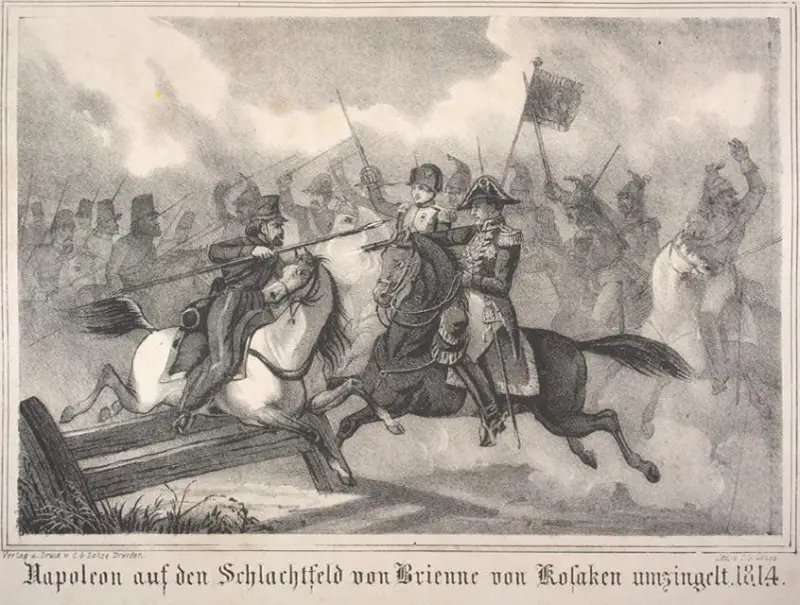
Cossack raid on Napoleon after the Battle of Brienne. Lithograph of the 19th century.
Allies in France
At the end of December 1813 - beginning of 1814, the allied armies and corps invaded France (How the Russian army ended up in France). The French Campaign of 1814 began.
A patriotic appeal from Tsar Alexander was read to the Russian troops:
We have already saved and glorified our fatherland, returned Europe to its freedom and independence. It remains to crown this great feat with the desired peace. May peace and quiet reign throughout the entire globe!
May each kingdom, under a single government of its own, be prosperous under its own authority and law! May faith, language, science, art and trade flourish in every land for the general welfare of the peoples! This is our intention, and not the continuation of warfare and destruction.
The enemies, entering the middle of our kingdom, inflicted a lot of evil on us, but also suffered a terrible execution. The wrath of God struck them. Let us not be like them: a humane God cannot be pleased with inhumanity and brutality. Let us forget their deeds; Let us bring to them not revenge and malice, but friendliness and an outstretched hand for reconciliation.
The glory of a Russian is to overthrow the militia enemy and, after being torn from his hands, weapons, to do good to him and his peaceful brothers..."
Sir Charles Stuart, observing the passage of the Russian Life Guards across the Rhine, wrote admiringly:
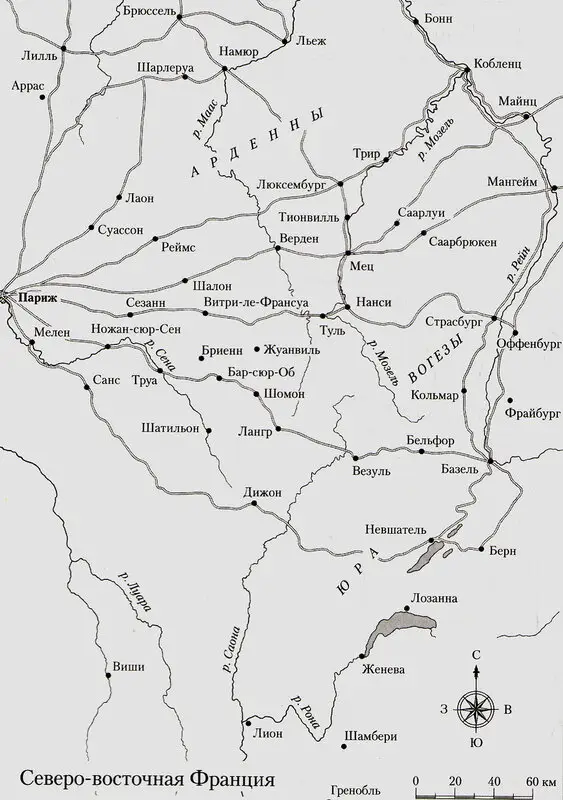
Napoleon: defense or attack
The French Emperor Napoleon was in a dangerous situation.
Despite all his efforts to form a new army, the French troops were greatly inferior in number and quality to the allied forces. Bonaparte had only about 70 thousand men at hand. The people, depressed by the burden of numerous victims of previous years, regulations and taxes, wanted peace. The population was gripped by apathy, which was not shaken by the enemy invasion.
To free the troops who were fighting in Spain, Napoleon tried to make peace with its king Ferdinand VII, his former captive. He offered him freedom and the return of the throne, the withdrawal of all French troops from the peninsula in exchange for a break with the British and the withdrawal of their troops from Spain. If the negotiations were successful, Napoleon could receive 80–100 thousand soldiers. However, negotiations proceeded slowly.
At a committee assembled to develop a plan for the country's defense, some generals proposed limiting themselves to containing the enemy, avoiding decisive battles, with attempts to influence the flanks and rear of the enemy. At the same time, readiness was expressed to give the eastern departments and even Paris to the enemy if military interests required it. So that the occupation of the capital by the enemy does not affect the defense of the country as a whole.
The Emperor did not approve of this plan. The loss of the east of the country and Paris seemed to him too great a loss. He triumphantly crossed all of Europe, only to now yield to the enemy. Moreover, the defensive strategy was not consistent with his usual modus operandi. Napoleon preferred to attack.
He decided, despite the weakness of his forces, to meet the enemy halfway and seek success in battles. Initially, they wanted to strengthen the capital with field fortifications and artillery, placing them on commanding heights, at the entrances to the suburbs. However, this idea was also rejected, under the pretext of maintaining peace among the townspeople.
Napoleon did not dare to raise the people against the invaders, which could have been his hope for preserving the French throne. In particular, the emperor was reluctant to accept the idea of calling up the national guard for the defense of the capital. Napoleon's brother, the former Spanish King Joseph, was appointed imperial governor, commander-in-chief of the people's troops. King Joseph also headed the 1st Military District.
The main depot of the active army was located in Paris: 30 battalion cadres of the line troops, 22 cadres of the Young Guard. They decided to reinforce the capital's artillery with 100 guns from Chalons, 80 from Bordeaux, 50 from Brest. However, there was a shortage of experienced artillerymen. Therefore, four companies of naval gunners were transferred from Cherbourg. Students of the Polytechnic School, retired disabled people and veterans of the four guards battalions permanently stationed in Paris were also to be trained in artillery.
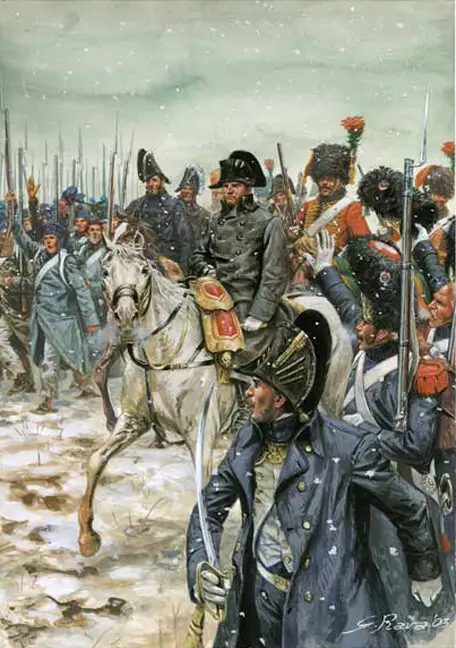
Long live the Emperor! Giuseppe Rava
New army
The formation of a new army was difficult. Many eastern regions were lost before recruits could be collected. Conceptions 1812–1814 gave about 80 thousand people instead of the expected 120 thousand people. Conscriptions from previous years – no more than 30 thousand people. They were sent to replenish the corps of Marmont, Victor and MacDonald. Some of the recruits were sent to Belgium, others to Lyon, where an army was formed in order to close the roads from Switzerland and Savoy. Others gathered in Paris or formed a reserve for the troops operating in Spain. The lack of men forced Napoleon to form battalions of 400 men, although the staff was 840 men.
After the fall of the Netherlands, Napoleon decided that the Allied advance into France would begin from here, so he transferred the best units from his small reserves to Belgium. The movement of the Main Army under Schwarzenberg to Langres forced Napoleon to recall the Old Guard, which he sent to Belgium.
The troops of Marmont, Mortier, Victor and Ney, about 60 thousand people in total, were supposed to delay the enemy in the valleys of the Seine and Marne. Macdonald and 15 thousand soldiers were also supposed to join them. Napoleon himself left for the army from Paris to Chalon on January 13 (25), 1814. He entrusted the management of state affairs to his wife Marie-Louise. King Joseph was supposed to help her.
Bonaparte entrusted the protection of his son and the Empress to the National Guard. At a council of officers of the Paris National Guard convened in the Tuileries, Napoleon declared:
All officers swore to keep the bond given to them.
In the Vitry area were located the 2nd Corps of Victor, the 6th Marmont, the Guard of Ney, the cavalry corps of the 1st Dumerkai and the 5th Milgo. In total, more than 40 thousand people with 120 guns. On the right flank near Troyes and Arcy were Mortier, parts of the guard, one of the divisions of the Parisian reserve - more than 20 thousand people. On the left wing on the march from Namur to Chalons under the overall command of MacDonald were: Sebastiani's 5th Corps, Macdonald's 11th, Exelman's 2nd Cavalry and Arrighi's 3rd Cavalry. The number of this group was small - about 9 thousand people.
The French emperor arrived at the troops' location in Chalons on January 26. The troops greeted him with joyful cries: “Vivat, Emperor!” The marshals were in a gloomy mood, but Napoleon, according to eyewitnesses, as was the case more than once at the beginning of his campaigns, seemed cheerful and energetic. From Chalons, the emperor moved to the southeast to overtake and destroy the troops of the hated Field Marshal Blucher.
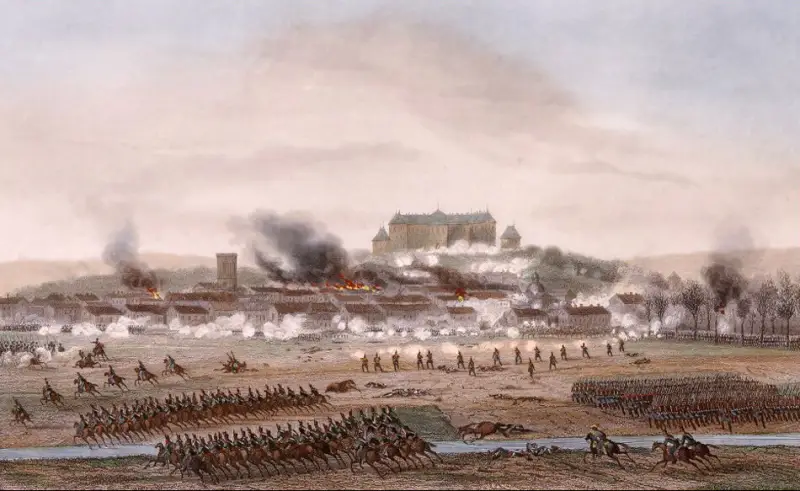
Battle of Brienne. Theodore Jung
Doubts among the Allies
Napoleon's actions eased the differences between the allies. The Viennese court was not interested in a further offensive and, through the Austrian commander-in-chief Schwarzenberg, restrained the movement of the allied armies. The Austrian Emperor Franz and Metternich, fearing the dominance of Russia and the strengthening of Prussia, believed that the occupation of a large part of France by the Allied forces was enough to force the French to peace. Vienna was even ready to conclude an alliance with Paris directed against Russia.
Metternich was able to persuade some representatives of the Prussian elite to the idea of peace with France. Thus, the Prussian Chancellor Karl von Hardenberg was inclined towards peace. And the adjutant general of the Prussian king, Knesebeck, actively promoted the idea that the advance of the allied armies to Paris would encounter the same difficulties that Napoleon's Grand Army experienced when advancing from Smolensk to Moscow. The problem of supply, security of communications and partisan warfare.
The British doubted. On the one hand, they did not want Russia to become stronger. On the other hand, they wanted to finish off Napoleon. Metternich's line was also followed by some Russian generals, Karl Nesselrode. Representatives of the southern German states also spoke out for peace.
However, Prussian Field Marshal Blucher was eager to reach Paris, dreaming of taking revenge on France for the humiliation of Prussia. He was supported by the Russian Emperor Alexander, who was the main ideologist of the continuation of the war.
Therefore, the main battles of the 1814 campaign took place between the Russian-Prussian corps of Blücher and Napoleon, while the main forces of the Allies - the Main Army of Schwarzenberg - played a supporting role. Napoleon decided to strike at the enemy corps that had moved forward.
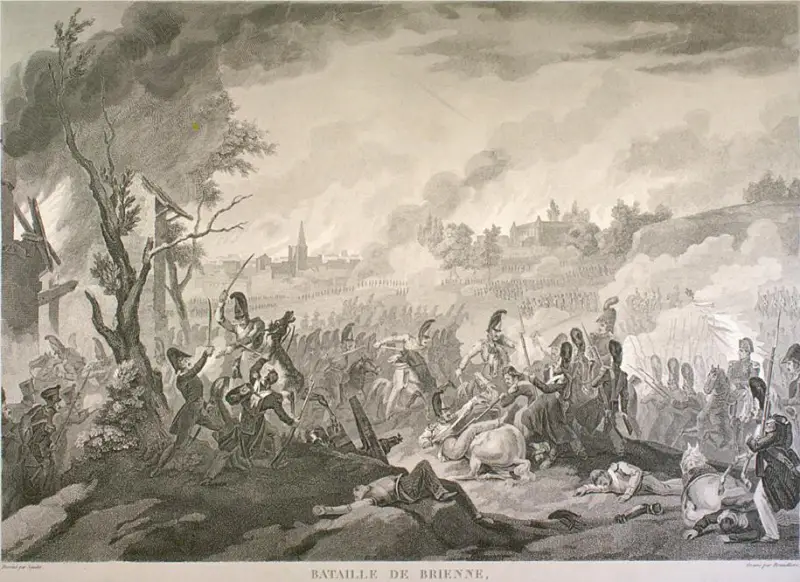
Russian troops are trying to recapture the castle in Brienne. 19th century engraving.
Disposition of Allied forces
Napoleon's actions were facilitated by the scattered position of the Allied troops. The allied army was stretched over 280 miles.
Blucher's army was divided. Lanzheron's Russian corps besieged border Mainz, York's Prussian corps blocked the fortresses of Metz and Luxembourg. Under Blucher's command, only the Russian corps of Osten-Sacken remained, which was advanced to Lemon on the Ob River; The 9th Infantry Corps of Zakhar Olsufiev was located near Brienne; Shcherbatov’s detachment stood near the town of Luzh on the Ob River; Lanskoy with the 2nd Hussar Division covered the communication line of Blucher's army, which connected him with York's corps. Blucher could also receive help from the Russian detachment of Count Peter Palen (1st Hussar Division with two Cossack regiments), which was the vanguard of Schwarzenberg’s Main Army.
In total, Blucher had about 25–30 thousand soldiers here.
Closest to Blucher's army, in Bar-sur-Aube, was the 3rd Austrian corps of Giulai (12 thousand people). The main apartments (headquarters) of the allied monarchs and Schwarzenberg were located in Chaumont and Langres. Schwarzenberg arrived in Langres on January 6 (18) and remained there for a whole week, showing no desire to continue the offensive.
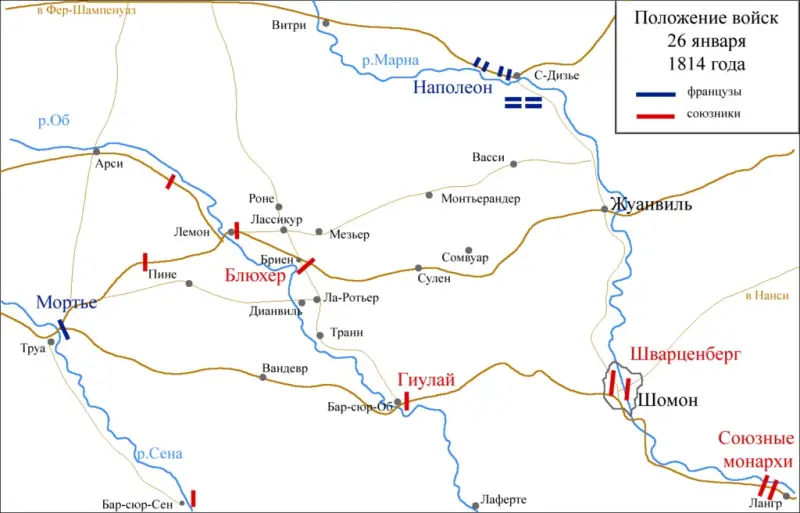
Battle
Napoleon initially wanted to attack the flank of the Main Army, but after success at Saint-Dizier he decided to attack Blücher's troops from the rear. On the morning of January 15 (27), Milgo's cavalry was able to take Lansky's hussar detachment by surprise in Saint-Dizier. Victor's infantry completed the success. Blucher's troops were cut off from York's corps.
Napoleon, having learned from local residents and prisoners about the stretched position of Blucher's army, decided to strike at him. On January 16 (28), French troops continued to move in several columns. The Guard marched towards Montierander; Victor with his corps and Milgo's cavalry along the Joinville road to Ragecourt, and then to Vassy; Gerard's troops - the divisions of Ricard and Dufour, who were stationed in the vicinity of Vitry - went to Lemon and Brienne. Marmont's troops - the 6th Infantry and 1st Cavalry Corps - remained at Saint-Dizier.
The transition of the troops was difficult. Country roads intended for transporting timber were wet from the rain. The guns got stuck in the mud. Therefore, the troops passed Montierandera at night. Marmont began the movement on January 17 (29), leaving one division to cover Saint-Dizier. Napoleon's main forces appeared at Brienne at about 2 o'clock in the afternoon.
It was not possible to deliver an unexpected blow to Blucher. The field marshal, having received Lansky's report, invited the corps of Giulai and the Crown Prince of Württemberg to get closer to him, and Palen's detachment to join the Silesian army. Lansky was assigned to monitor the roads leading to Joinville and Saint-Dizier.
New news forced the Prussian commander to take the situation more seriously. Early in the morning of January 17 (29), the Cossacks delivered the captured French staff officer, Colonel Bernard, whom Napoleon sent to Marshal Mortier with orders to join the right flank of his army. From him they learned information about the number and direction of movement of the French troops. The threat became obvious.
Blucher occupied Brienne with the forces of Olsufiev (5 thousand infantry and 24 guns) and ordered Saken to immediately retreat to Brienne. Blucher did not consider it possible to stop Napoleon’s army and was going to join forces and retreat to Bar-sur-Aube, joining with the nearest corps of the Main Army. Olsufiev's weak corps was reinforced by Palen's detachment (2 thousand people). Palen's detachment covered Saken's corps from the flank, settling in Lassicourt. The detachment of Prince Shcherbatov (900 Cossacks, the Chuguev Uhlan regiment and 4 horse guns) took positions in Mezières.
Schwarzenberg, having received news of the battle at Saint-Dizier, was more concerned about the position of his army than the threat to Blücher's army. He feared that he would be cut off from the Rhine, and took measures to ensure an outflanking maneuver of the right flank of the Main Army. The corps of Wittgenstein and Wrede (about 40 thousand people) were ordered to go to Joinville, and the corps of Giulay and the Crown Prince of Württemberg were ordered to concentrate between Bar-sur-Aube and Chaumont.
At two o'clock in the afternoon, the French cavalry attacked the detachment of Prince Shcherbatov. Russian troops were pushed back to Brienne. To strengthen the defense of Brienna, with the loss of which Saken’s corps was cut off, Blücher ordered 4 and 34 regimental regiments from Palen's squadron to be positioned ahead of Brienna. Palen was also attacked by the superior forces of the French cavalry and began to retreat to Brienne.
Around four o'clock, most of Saken's corps approached Brienne. Due to the bad road, Napoleon's units could not enter the battle at the same time and were brought into battle as they approached. Napoleon ordered Brienne to be shelled, and in the evening he organized a general attack. Ney's troops advanced in two columns, Duhem's division from Victor's corps advanced on the left flank, and General Chateau's special column was ordered to occupy Brienne Castle. The entire French cavalry was collected on the right flank. Ney's soldiers broke through to the artillery positions, captured two guns and rushed into the city. The French dragoons almost killed Osten-Sacken himself, his convoy was killed, and the quartermaster general of the corps, Rochechouart, was killed.
The situation was saved by Russian artillery. General Nikitin took 24 guns from the reserve, placed them parallel to the Mezieres road and opened heavy fire on the enemy’s flank. The French suffered heavy losses and retreated, abandoning the captured guns. Gathering all the available cavalry, Palen overthrew Victor's infantry in front of Napoleon. The Russian cavalry captured 8 guns, but were able to take away only 5 guns.
Closer to the night, the French nearly captured Blucher and his generals. Brigade Chateau, having made a detour, a sudden attack seized the castle of Brienne. Blucher arrived there shortly before to explore the area. Blucher and Gneisenau were able to go top. It was almost captured Saken. French dragoons drove past him, not noticing him at dusk. This enabled the general to get out into the field and gallop away to the location of his troops.
Blucher tried to recapture the castle, which occupied a dominant position over the city. The regiments of Olsufiev and Saken went on the attack. The fierce battle continued until midnight. The French were driven out of the burning ruins of the town, but they held the castle. This ended the battle.
Blucher did not intend to fight to the last extreme. After a short rest, at 2 o'clock in the morning on January 30, Blucher began to withdraw troops to Trann, to join the Main Army.
In this battle, not only the Russian-Prussian command was in danger. When the French emperor was returning to his camp after the battle, his convoy was attacked by Cossacks who had penetrated the French rear. Napoleon personally had to fight off the Cossacks. The emperor's retinue was able to repel the attack.
Both armies in this battle lost thousands of people killed and wounded by 3. Several hundred people were taken prisoner. From the French side, Rear Admiral Pierre Bast fell in battle, divisional generals Deco and Lefevre-Denouette were injured.
The stubborn resistance of the Russian troops caused confusion among the French. The French command believed that Blucher would receive reinforcements at night and the battle would continue in the morning, with the numerical advantage already on the enemy’s side. In case of defeat, the French troops will have to retreat along bad roads, with the enemy having an advantage in cavalry. However, the fears turned out to be in vain.
Thus, Napoleon gained the upper hand in the first serious battle of the 1814 campaign. The French army, with significant numerical superiority, forced the enemy to retreat and gained a tactical advantage. The morale of the French army, largely composed of raw recruits, rose.
However, the main task was not solved: Blucher's army was not defeated, and the Allies continued their offensive.
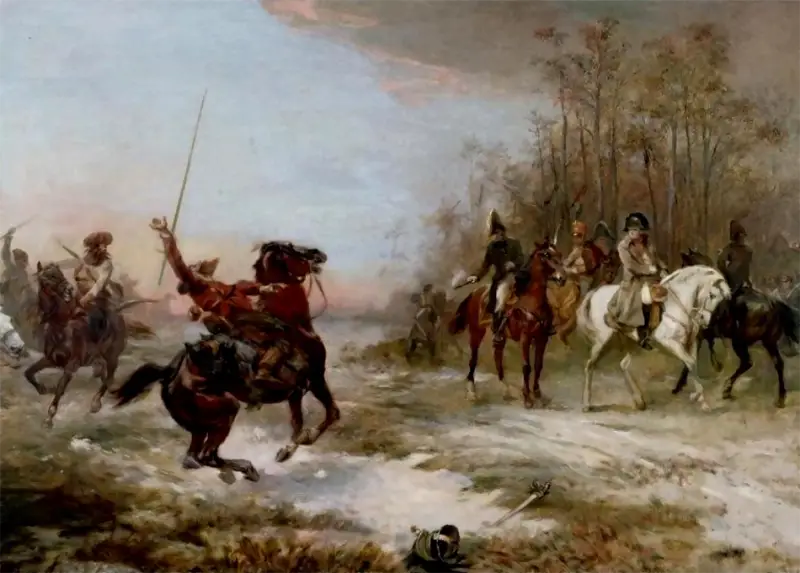
Robert Hillingford. Napoleon escapes from Russian Cossacks during the Battle of Brienne
Information